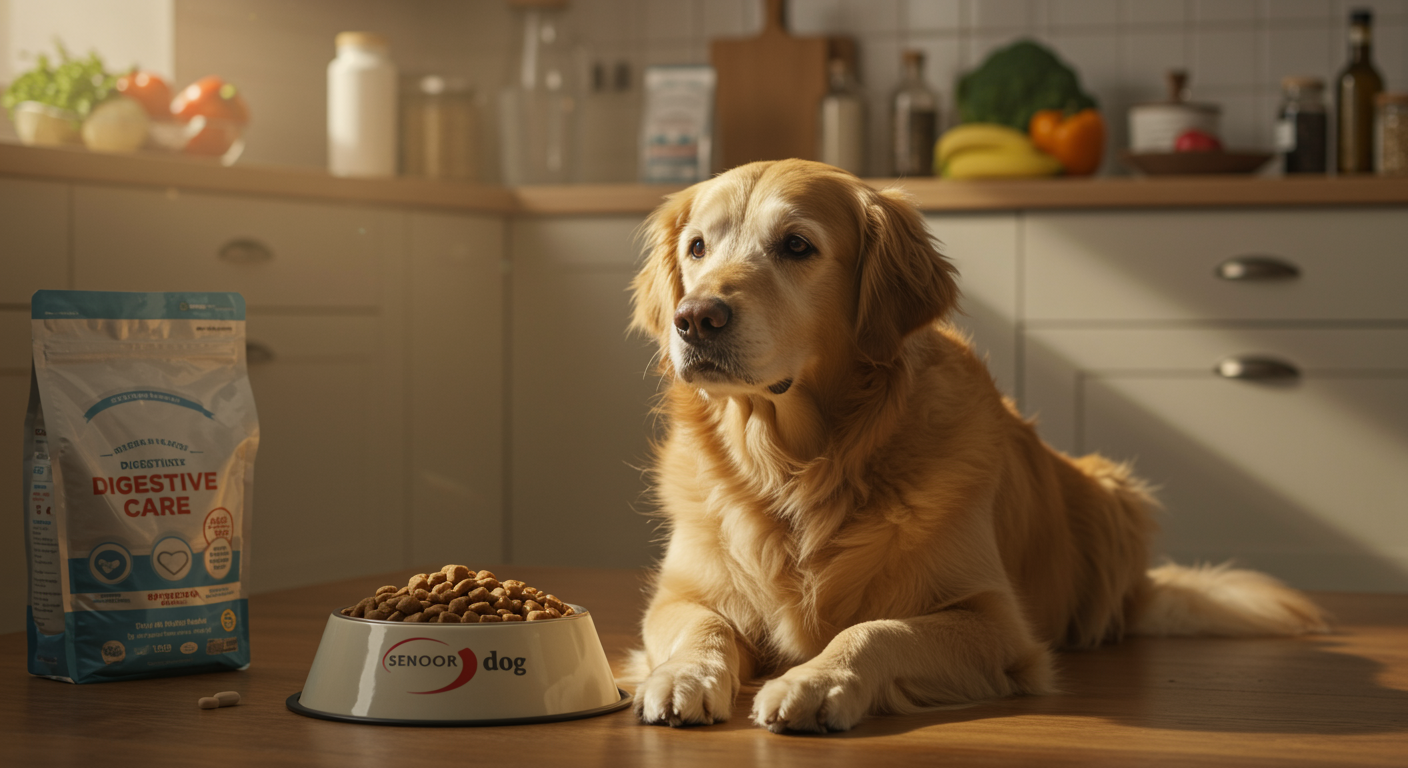As our beloved Golden Retrievers enter their senior years, typically around 7-8 years of age, their digestive systems undergo significant changes that require careful attention and understanding. Senior Golden Retrievers are particularly susceptible to various digestive complications due to their breed characteristics, reduced metabolism, and age-related physiological changes.
Understanding these digestive challenges is crucial for maintaining your senior Golden’s overall health and ensuring they enjoy their golden years with comfort and vitality. This comprehensive guide will explore the most prevalent digestive issues affecting aging Golden Retrievers, their underlying causes, identification methods, and evidence-based management strategies.
Understanding the Aging Digestive System in Golden Retrievers
Physiological Changes in Senior Dogs
The digestive system of senior Golden Retrievers experiences several age-related modifications that can predispose them to various complications. As dogs age, their digestive enzymes become less efficient, gastric acid production decreases, and intestinal motility slows down significantly.
These physiological changes create an environment where food processing becomes more challenging, nutrient absorption decreases, and the risk of digestive disorders increases substantially. Senior Golden Retrievers also experience reduced liver function and slower kidney processing, which directly impacts how their bodies handle toxins and process nutrients.
Breed-Specific Predispositions
The breed’s genetic predisposition to certain conditions, combined with years of dietary habits and environmental factors, creates a complex scenario that requires specialized attention from pet owners and veterinary professionals.
Golden Retrievers are genetically prone to food allergies, inflammatory conditions, and metabolic disorders that become more pronounced with age. These predispositions require proactive management through strategic dietary planning and regular veterinary monitoring.
Most Common Digestive Issues in Senior Golden Retrievers
Chronic Gastritis and Acid Reflux
Understanding Chronic Gastritis
Chronic gastritis represents one of the most frequent digestive complications in senior Golden Retrievers. This condition involves inflammation of the stomach lining, often accompanied by acid reflux, which can cause significant discomfort and long-term health complications.
Senior Golden Retrievers develop chronic gastritis due to prolonged exposure to dietary irritants, stress, bacterial infections, or as a secondary condition related to other health issues. The reduced gastric motility in older dogs allows stomach contents to remain longer, increasing irritation and inflammation.
Identifying Gastritis Symptoms
Signs of chronic gastritis include frequent vomiting, especially in the morning or after meals, excessive drooling, loss of appetite, and visible discomfort after eating. Dogs may also exhibit grass-eating behavior more frequently as they attempt to soothe their stomach irritation.
Management Strategies for Gastritis
Treatment typically involves dietary modifications, including smaller frequent meals, easily digestible foods, and potentially prescription medications to reduce stomach acid production. Stress reduction and environmental modifications also play crucial roles in management.
Inflammatory Bowel Disease (IBD)
Understanding IBD in Senior Dogs
Inflammatory Bowel Disease is a complex condition that affects the intestinal tract, causing chronic inflammation that interferes with normal digestion and nutrient absorption. Senior Golden Retrievers are particularly susceptible due to their immune system changes and cumulative exposure to dietary antigens.
Clinical Presentation
IBD in senior Golden Retrievers manifests through chronic diarrhea, weight loss despite normal appetite, frequent gas, and intermittent vomiting. The condition can affect different sections of the intestinal tract, leading to varying symptom presentations and severity levels.
Diagnostic Approaches
The diagnosis requires comprehensive veterinary evaluation, including blood tests, fecal examinations, and potentially endoscopic procedures to assess the intestinal lining directly. Advanced imaging may be necessary to rule out other conditions.
Treatment Protocols
Management typically involves anti-inflammatory medications, specialized diets, and sometimes immunosuppressive therapy. Long-term monitoring and dietary management are essential for maintaining remission.
Pancreatic Insufficiency
Pathophysiology of Pancreatic Insufficiency
Pancreatic insufficiency occurs when the pancreas fails to produce adequate digestive enzymes, severely impacting the dog’s ability to break down and absorb nutrients from food. This condition is particularly concerning in senior Golden Retrievers as it can lead to rapid weight loss and malnutrition.
Clinical Signs and Symptoms
Dogs with pancreatic insufficiency typically produce large volumes of pale, greasy stools with a particularly foul odor. Despite eating normal or increased amounts of food, affected dogs continue losing weight and may develop vitamin deficiencies.
Treatment and Management
Early detection and proper enzyme supplementation can effectively manage this condition, allowing senior Golden Retrievers to maintain good nutritional status and quality of life. Dietary modifications and vitamin supplementation may also be necessary.
Comprehensive Digestive Issues Comparison
| Condition | Primary Symptoms | Onset Pattern | Severity Level | Treatment Approach |
|---|---|---|---|---|
| Chronic Gastritis | Morning vomiting, drooling, appetite loss | Gradual, progressive | Moderate | Dietary management, acid reducers |
| Inflammatory Bowel Disease | Chronic diarrhea, weight loss, gas | Intermittent flares | Moderate to Severe | Anti-inflammatory drugs, specialized diet |
| Pancreatic Insufficiency | Greasy stools, weight loss, increased appetite | Gradual progression | Severe | Enzyme supplementation, high-quality diet |
| Intestinal Parasites | Diarrhea, vomiting, visible worms | Sudden or gradual | Mild to Moderate | Antiparasitic medications |
| Food Allergies | Skin issues, digestive upset, ear infections | Variable | Mild to Moderate | Elimination diet, hypoallergenic food |
| Constipation | Straining, hard stools, discomfort | Gradual | Mild to Moderate | Fiber supplementation, increased water |
Identifying Early Warning Signs
Physical Indicators
Changes in Bowel Movements
Recognition of early warning signs is crucial for preventing minor digestive issues from developing into serious health complications. Senior Golden Retrievers often mask their discomfort, making careful observation essential for early detection.
Changes in bowel movement patterns represent one of the most reliable indicators of digestive problems. Normal bowel movements should be well-formed, brown in color, and produced regularly. Any significant deviation from your dog’s established pattern warrants attention.
Appetite and Eating Behavior Changes
Appetite changes, whether increased or decreased, can signal digestive complications. Senior Golden Retrievers with digestive issues may show interest in food but eat smaller portions, or conversely, may appear constantly hungry due to poor nutrient absorption.
Behavioral Indicators
Activity Level Changes
Behavioral changes such as reluctance to exercise, seeking isolated areas, or changes in sleeping patterns can indicate digestive discomfort. Senior dogs may also exhibit increased restlessness, especially after meals, as they experience digestive distress.
Comfort-Seeking Behaviors
Dogs experiencing digestive issues may exhibit specific comfort-seeking behaviors, including preference for cool surfaces, unusual positioning during rest, or increased attention-seeking behavior when experiencing discomfort.
Dietary Management Strategies
Age-Appropriate Nutrition
Protein Requirements and Quality
Proper dietary management forms the foundation of digestive health maintenance in senior Golden Retrievers. Age-appropriate nutrition requires careful consideration of protein quality, fat content, fiber levels, and digestibility factors.
Senior Golden Retrievers benefit from easily digestible proteins that provide essential amino acids without placing excessive burden on the digestive system. High-quality protein sources such as chicken, fish, and eggs are generally well-tolerated and provide excellent nutritional value.
Fat Content Optimization
Fat content must be carefully balanced to provide essential fatty acids while avoiding excessive burden on the digestive system. Senior dogs typically require moderate fat levels to maintain energy while preventing digestive upset.
Feeding Strategies
Portion Control and Frequency
Portion control and feeding frequency adjustments can significantly improve digestive function. Smaller, more frequent meals reduce the workload on the digestive system and improve nutrient absorption while minimizing the risk of gastric distension and discomfort.
Meal Timing and Consistency
Consistent meal timing helps regulate digestive processes and allows for better monitoring of appetite and digestive function. Regular feeding schedules also support overall health and behavior stability.
Treatment Approaches and Management
Veterinary Interventions
Diagnostic Procedures
Professional veterinary care is essential for accurate diagnosis and effective treatment of digestive issues in senior Golden Retrievers. Comprehensive evaluation typically includes physical examination, blood chemistry panels, fecal analysis, and potentially advanced imaging studies.
Medication Management
Prescription medications may be necessary for managing chronic conditions such as inflammatory bowel disease or severe gastritis. These medications require careful monitoring and dosage adjustments based on the dog’s response and overall health status.
Monitoring and Follow-up
Regular follow-up appointments allow for treatment plan adjustments and early detection of potential complications. Senior dogs require more frequent monitoring due to their increased susceptibility to side effects and disease progression.
Home Care and Monitoring
Daily Observation Protocols
Effective home care involves consistent monitoring of your senior Golden Retriever’s digestive health through careful observation of eating habits, bowel movements, and overall behavior patterns.
Record Keeping
Maintaining a daily log of symptoms, dietary intake, and medication administration helps identify patterns and provides valuable information for veterinary consultations. This documentation is particularly important for chronic conditions requiring long-term management.
Environmental Modifications
Environmental modifications such as elevated feeding stations can improve comfort during meals and reduce the risk of gastric distension. Stress reduction techniques and consistent routines also contribute to digestive health maintenance.
Preventive Measures and Long-term Health
Proactive Health Maintenance
Regular Veterinary Care
Prevention strategies focus on maintaining optimal digestive health through appropriate nutrition, regular veterinary care, and lifestyle modifications that support healthy aging.
Parasite Prevention
Regular parasite prevention programs are crucial for senior Golden Retrievers, as their immune systems may be less effective at fighting off parasitic infections that can cause significant digestive complications.
Supporting Overall Health
Dental Health Connection
Dental health maintenance directly impacts digestive function, as poor dental health can lead to bacterial overgrowth and swallowing difficulties that affect the entire digestive process.
Exercise and Mental Stimulation
Appropriate exercise levels and mental stimulation support digestive health by promoting proper gut motility and reducing stress-related digestive issues.
Advanced Care Considerations
Specialized Treatment Options
Prescription Diets and Supplements
Senior Golden Retrievers with chronic digestive issues may require specialized care approaches, including prescription diets, probiotics, and digestive enzyme supplementation to maintain optimal nutritional status.
Alternative Therapies
Some senior dogs may benefit from complementary therapies such as acupuncture or herbal supplements, though these should always be discussed with veterinary professionals before implementation.
Quality of Life Assessment
Monitoring Parameters
Regular monitoring of body weight, body condition score, and muscle mass helps assess the effectiveness of treatment plans and identify the need for adjustments in dietary or medical management.
Long-term Care Planning
Quality of life assessments should be conducted regularly to ensure that treatment approaches are providing meaningful benefits and that your senior Golden Retriever maintains comfort and dignity throughout their golden years.
Understanding and proactively managing digestive issues in senior Golden Retrievers requires dedication, patience, and close collaboration with veterinary professionals. With proper care and attention, most digestive complications can be effectively managed, allowing your beloved companion to enjoy their senior years with optimal comfort and health.




